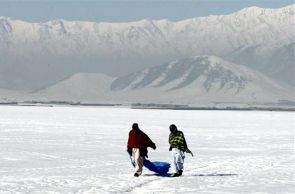 | « Back to article | Print this article |
 India on Friday said Afghanistan faced persistent threat of terrorism from beyond its borders and asked regional countries to acknowledge the rising dangers posed by these forces and step up counter-terrorism efforts.
India on Friday said Afghanistan faced persistent threat of terrorism from beyond its borders and asked regional countries to acknowledge the rising dangers posed by these forces and step up counter-terrorism efforts.
External Affairs Minister Salman Khurshid, addressing the 'Heart of Asia' ministerial conference in Kazakh capital, also made it clear that India did not see Afghanistan as a zone of competitive influence and want it to be an opportunity for regional cooperation.
He said Afghanistan would experience lasting peace only if short-sighted perceptions of competition and strategic depth were replaced by collaboration and economic investment by countries of the region and the rest of the world.
"While striving for realisation of this vision, we however do not have any illusion that, we can ignore political and security issues that stand in the way. We have no doubt that the greatest challenge posed to vision of Afghanistan is the persistent threat of terrorism that emanates from beyond its borders," he said.
The meeting on Afghanistan is the third Heart of Asia ministerial-level meeting of the Istanbul Process and is attended by 14 countries in the neighbourhood and 16 others.
It assumes significance in the wake of the proposed withdrawal of US-led NATO forces from Afghanistan in 2014.
Noting that other countries in the region, especially India, were not immune to this threat, Khurshid said an honest commitment to the principles enshrined in the Almaty Declaration will have to begin with an "acknowledgment of the rising dangers posed by these forces of extremism and terrorism to the future of Afghanistan."
The Almaty draft, finalised late last night by members of the grouping, calls on regional and non-regional countries to step up counter-terrorism efforts at national and multi-lateral levels, particularly with a focus on dismantling terrorist and organised crime sanctuaries, safe havens, and disrupting the financing, training and equipping of terrorist activities.
Khurshid said India recognised that the solution to Afghanistan's problems cannot be purely military but has to be rooted in political approach that enjoyed a democratic sanction.
Sharing India's vision of the Heart of Asia process, Khurshid said he saw it as one of trade, transit, energy and communication routes crisscrossing and knitting the entire region from Turkey to India and other countries of South Asia, and between Eurasia and the Arabian Sea, with Afghanistan at its heart.
"But we do not see Afghanistan as merely a 'bridge' or a 'roundabout' connecting these regions contributing only as a transit route, but as a possible driver of economic growth in the region with development of its human resources; its natural endowment including minerals and hydrocarbon resources," he said.
Stressing that India's focus has been on economic empowerment of Afghanistan, Khurshid said New Delhi had waived off basic customs duties on all Afghan products thus giving them preferential access to the 1.2 billion Indian market.
He said India would be constructing Afghanistan's first steel plant and has made investments in the Hajigak iron ore mines.
Khurshid also called on Kazakhstan President Nursultan Nazarbayev and met foreign ministers of Turkey and Kyrgyzstan on the sidelines of the conference.
The minister was also seen having a chat with Pakistan Foreign Secretary Jalil Abbas Jilani in the conference hall.